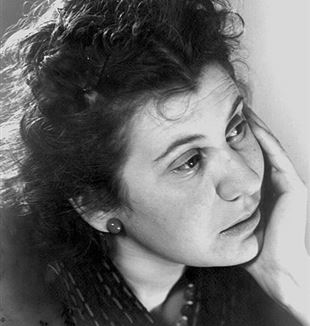
Digging out God
A bond with God, discovered deep within, is the source of freedom in any situation, even prison. The life of Etty Hillesum will be the subject of one of the exhibits at the Meeting of Rimini.There has been a silence of 40 years for Esther Hillesum, “Etty” to her friends, even for those who began to learn about her when her Diaries were published in 1981 and she began to be known throughout the world. “In those two years of life enclosed in ten notebooks, written between March 1941 and October 1942, and in her letters to friends, is all of Etty,” says Fr. José Clavería, a curator of one of the key exhibits of the 2019 Meeting of Rimini. Many aspects of her story touch on the theme of religious freedom. A Dutch Jew who was born in 1941 and died in Auschwitz on November 30, 1943, Etty was at first “far from God, frail and dissatisfied,” but then “transfigured” by the discovery of God in looking “deep within her,” as Benedict XVI said in one of his last audiences.
As Clavería says in a conversation with the group that prepared the Rimini exhibit, the common thread of Etty’s life was “a burst of freedom.” “This happened while day after day, from the German occupation to the concentration camp, the conditions of ‘freedom’ deteriorated more and more.” Outside she was increasingly hemmed in, but within, in her relationship with whatever happened, she discovered she was increasingly free.
“Many elements of Etty’s story in some way demonstrate features of today’s world ante litteram,” continues Clavería. “She was Jewish, but not particularly bound to religion. She grew up and lived in a secularized world.” And she was part of it, in her affair with the widower for whom she worked, in her relationship with Julius Spier, the psycho-chirologist and student of Jung, and in her choice to have an abortion. “For her, the discovery of God developed through all this, not out of nothing. The encounter with Spier, which marked the beginning of her diary writing, was a crucial point.”
Etty began to look at her feelings, desires, and insecurities with a mixture of criticism and tenderness. “I almost feel the urge to stroke my head and tell myself, ‘But you’re so little, you’ll see, everything will work out.’” In this dynamic, explains Clavería, “Etty literally ran up against God” in a relationship she described in her diary. “There is a really deep well inside me. And in it dwells God. Sometimes I am there, too. But more often stones and grit block the well, and God is buried beneath. Then He must be dug out.”
In digging out God, even in conditions that caused many fellow Jews, her people, to lose their faith, she decided to follow them voluntarily to Auschwitz, rejecting an opportunity to escape. Everything happens inside circumstances. She constantly asserted that “life is beautiful,” even in front of the butchers she could not hate. “She herself was surprised by this,” explains another curator, Claudia Munarin. “The first impact of the discovery of God is on herself, as wonder. In her Diaries she did not recount things just to describe them, but is concerned with what they generated in her.” The key point is a judgment on reality. “She said that ‘the facts are not what count in life; what counts is only what you become through the facts.’” Etty did not minimize what happened, adds Munarin. “On the contrary. When she was in difficulty and tormented, when she realized that she was not ‘living up to the greatness of her desire,’ she returned there, to reality, to cooking, mending socks, seeking out a friend.”
This was not intimism, says Clavería: “Etty was aware of being part of the building of history when she was in prison, where a small community formed around her. Earlier too, in the group of Spier’s friends, and later in the concentration camp of Westerbork, Holland, it was understood that a people was being created around her.”
She had her freedom, her conscience, and her faith. “Etty is a flower blooming in the desert,” adds Clavería. “In a certain sense, she revealed the flaw in the ‘progressive’ theories that said that with technical, scientific, and cultural progress, religion would disappear. Instead, as many scholars have documented, religion is alive in the modern world.” There are dangers and deviations like fundamentalism, a suffocating claim to ideological neutrality, an attempt to reduce the space of faith into a social and cultural construction, and even persecutions in the strict sense of the word. “But religious freedom is also expressed through the testimony of many peoples and individuals who live faith as a source of peace. This, still today, is the life of Etty.”